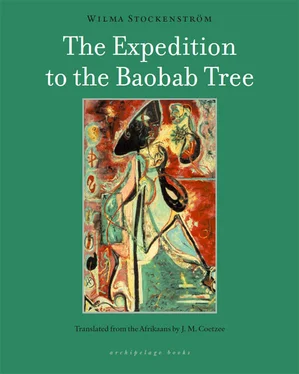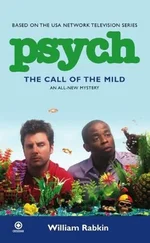The hunters were surprised to encounter a woman. One laughed so much that all his tooth stumps showed, and I got furiously annoyed and withdrew. In contrast our two leaders carried on a lively conversation with them. I understood that they wanted to gain as much information as possible, but I could not help feeling the hunters’ stealthy glances on me. After a while I went and hid behind a bush. I heard the eldest son trying to arrange a barter and trying to buy provisions from them. I heard him take cross money out of his embossed leather bag with long soft tassels and let the coins tinkle through his fingers back into the bag; but the hunters were not interested in such a bargain, for, they explained, they had only enough meat for themselves. The eldest son had to put away his heavy cash with nothing achieved.
The stranger was more interested in the precise direction we should take. The city lay in the sunset, he learned. Still many plains, then the vegetation grew thinner, then the ground between the grass tufts turned to sand, then there was more sand and the tufts would quiver silvery here and there, then the sand would become dunes, they would loom steep and rippled, perfectly formed humps with perfect stillnesses in between, and behind dunes after dunes after dunes which we would wearily climb, there would lie the city.
But first the waters, said one of the hunters. Yes, confirmed another, first the waters, the great shining, profuse in flowers, profuse in shadows, profuse in game, the reflection that would seem to be a reality out of which tiger fish leapt viciously, where the honeybirds called one on without cease and at dusk the kudu stepped out of the mopani forests and the marabou storks flew up like ghosts to cover the moon with their wings.
Messages were communicated to the hunters to pass on, when they got back to their kraal, to the ivory traders from the city who would come and buy the tusks. Thus the stranger and the eldest son tried to restore a connection. I had nothing to say. The other slaves were silent too. We existed where we found ourselves at the moment, and they, the stranger and the eldest son, existed from the coastal city as far as here and further as far as the desert city and the other desired cities, and they existed even further than that, they existed as far as over the seas that lay between the lands, and in those lands too they existed. But I was without connection. I was solely I.
The hunters had barely disappeared from sight when the eldest son and the stranger leapt to work, filled with a feverish zeal that infected the slaves as well, and in a jiffy everything was ready and we could push on, after all the many days of drowsy bewitchment when we had been like sleepwalkers each spun into a cocoon of pleasant absent-mindedness. When the water spirit enchanted us and bound up our thoughts.
Secretly I was relieved that the hunters had left, for their lecherous glances felt as if they stuck to me, and I felt that I was struggling to pull the cloying streaks off me, from my breasts and nipples and from my belly; but worst was the feeling of ruttishness they had aroused in me.
Thus the summer moved on. The great river already lay far away, the city of our desires still in the remote distance.
One afternoon we halted at the foot of a koppie with a cornice of round rocks. We had by now several times come upon these koppies with tremendous rocks on top. In our coastal region we never saw such formations and we could not help remarking on them. It was almost as if we were discussing art works. We praised their proportion and splendid balance, as it were the craftsmanship and sensitivity with which they were so arranged that it looked as if they would have to roll down and rumble across the veld till they found a little hollow of rest where the sun could crack them open or perhaps till they smashed into another of their sort and splintered.
Now we wanted to examine such rocks from closer by and climbed the koppie, the eldest son, the stranger and I, while the slaves got supper together unsupervised and made our beds ready. The one who no longer carried anything was the one who gave the orders, I noticed. Strange that he, so unattractive, with his slight build and unremarkable features, had never seemed to me a potential leader, though I must add that till now I had never thought of possible leaders among them. They were simply the slaves, the eunuchs who did the hard work without getting any choice and obeyed the expedition’s leaders without answering back. Could he possibly be of royal blood? One could easily get soppy in one’s speculations. Perhaps he was simply the smartest of them: to judge by his organizational ability that was the most likely explanation. He wore a great white snail-shell about his neck. Still, I thought, he deserved to be watched closely: but I hesitated to express my suspicions to either the stranger or the eldest son.
Once I caught the slave leader opening a pack and taking tools out, adzes and gouges and awls and so forth, which had presumably been brought along to hollow out a tree trunk somewhere where that seemed necessary, a problem that had been surmounted by the use of the hunters’ raft. I saw how lovingly he handled the tools, just like a craftsman. I saw him absorbed in arranging them in categories according to use and size, and saw how he then packed all the tools in again, very neatly, very skillfully. Then he put the pack down with the others.
There was a surprise for us on top of the koppie. Two surprises. The first was remnants, limited but nevertheless there, of stone walls of the same design we had encountered several times previously, only more badly destroyed, or longer in disuse. More dilapidated. No single length stood intact, there were only weathered knee-high fragments overgrown with thorn bushes; but one could infer the builders’ plan from stone block to stone block. In the afternoon sun the stones shone with the same honey color as the blocks against which and over which they were packed. If one could have stayed longer one might have discovered other objects. Where had all the inhabitants gone? We wondered and guessed. Were their skeletons squatting under the earth of the plain around us, undecided whether to rise and brave the dangerous journey to the land of the ancestors, or did they feel abandoned by their descendants? No one left to make a libation. Only wine and hyena laughter. Here something was utterly annihilated. Here was nothing but sorrow, nothing but meaninglessness and battered traces of glory. From below a thin trail of smoke ascended into the sky in confirmation of our entirely superfluous presence. Ah, I sighed, how long are we still to journey?
The second surprise on top of the koppie made me even sadder. The stranger was the first to come upon a cave on the east side, but I was the first to notice the curious drawings on the rock walls. They seemed to look like people, but also like stick insects, painted aimlessly sometimes in a bunch, sometimes singly, sometimes one on top of another in rust-brown and white. Very faint. Who in the name of the creator of all things would have come here to immortalize himself, and in so unfinished a way? It was too odd. Surely not the inhabitants of the walled town. The stranger complained about the lack of finish and the obvious absence of artistic rules in these clumsy attempts. Obviously backward painters from a backward society. Totally amateurish. The work of adult children. Yet not quite. No explanation occurred to us. The little figures so free of all connection, exiled here in the heart of the wilderness. There were too many questions here, and the dreariness of no answers. Here people had come and gone, again come and gone, dreary, to all eternity.
Here, said the eldest son, is one that looks like a buck.
The stranger expatiated tastefully on paintings on parchment and silk that he had seen on his travels in other lands, the richness and subtlety of their use of color and the fine balance between the trees, birds and people — recognizable as trees, birds and people, he emphasized-painted by trained artists and classifiable in schools and trends, and valuable possessions too. With the blade of his dagger he scratched at one of the ridiculous drawings. Someone’s way of passing the time, he decided. It has nothing to do with art. It records nothing, it does not mean to communicate anything, or to satisfy aesthetically. It is functionless. The more the stranger spoke, the more heated he grew about the rock drawings, and in fact now he began to scratch them off.
Читать дальше












